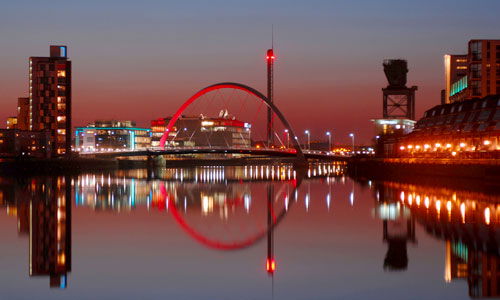Glasgow is set to benefit from ambitious plans to install sensors on to street light poles that will able to inform Glaswegians of traffic incidents and other disturbances via changing light levels and routines. This project should make life better, safer and more sustainable for the City’s inhabitants, as James Hunt reports:

If you were a frequent pedestrian, cyclist or driver in Glasgow, you would be happy to know whether there is a traffic incident in the direction you’re heading, wouldn’t you? Improved cycle and walking routes across the city would be great too, as would better bus routes and public transport…and intelligent street lighting could help achieve all of this.
And there could be significant business opportunities for enterprising electrical contracting firms in the area.
Glasgow City Council is planning to make use of intelligent streetlights to help provide such benefits, as well as to reduce crime. This is all part of ‘Future City / Glasgow’, which is an ambitious £24m programme aimed at demonstrating how the latest ‘smart’ technologies can make life in the city smarter, safer and more sustainable.
The aim is to install sensors on street lighting columns, which will collect data such as the number of people walking by (footfall), air and noise pollution levels and other variables. The sensors will then make the street lights react to produce more light exactly when and where it is needed.
The smart lights will also be programmed to increase in brightness if the noise level rises, which might – for example – indicate a possible disturbance in the area.
Furthermore, the sensors could also be programmed to flash the street lighting, which would help guide the emergency services to the exact place that any disturbance occurred.
The pilot project, which will come within the framework of the ‘Future Cities’ initiative that aims to test future technology solutions in the city - with funding from the UK government's Technology Strategy Board - will integrate with Glasgow’s City Operations Centre. This will enable staff monitoring the new network of CCTV cameras to zoom in on any problems.
This lighting scheme will also be in use for community events and outdoor festivals.
A trial of a streetlight scheme for cycle routes has already been announced, in which the smart street lights will dim when not in use, and will brighten up when a cyclist approaches over a 40 to 100% range.
Energy efficiency too
In addition, the latest long-life, energy efficient LED lamps will be installed to show how Glasgow could use them to reduce carbon emissions, increase safety and cut power consumption.
The LED lighting system will be far more responsive than the existing lighting network and could also be operated remotely from the Operations Centre. This would allow for increased lighting if there were an event taking place, such as concerts or street festivals.
Power-saving technology is already used on escalators on the Glasgow Subway, which run slowly while unused, then increase to normal speed when someone steps onto them.
Monitoring of energy levels across the city, including the new Combined Heat and Power (CHP) systems, will allow the city to store energy when demand is low and then use it during times when it is higher. This could cut people's fuel bills and help the city in its fight against fuel poverty.
In the forefront
Commented Councillor Gordon Matheson, Leader of Glasgow City Council: "This (£24m programme) is a huge boost to Glasgow's ambitions to build a better future for our city and its people. This investment and the work we will be doing will put us at the forefront of innovative and smart cities, not just in the UK, but also in Europe and beyond.
He continued: “Glasgow is proud to be demonstrating innovative ways in which technology can make life in the city smarter, safer and more sustainable. Glasgow is a city which is constantly evolving and regenerating and we are always looking to the future.”
At its simplest, the ‘Future City / Glasgow’ project will allow the development of a one-stop shop City Dashboard, which will help monitor city systems from traffic lights and CCTV, to air quality monitoring and street lighting faults and services, such as hospital waiting times and journey planning.
There will be other benefits though. The smart system will also monitor footfall and retail demand to see which parts of Glasgow are doing well, and also which areas need more support. It will also allow the public to plan a shopping outing by judging where is busiest or quietest in the city. Via a smartphone app, Glaswegians will be able to report issues like potholes or missing bin collections and monitor their resolution.
To learn more, go to http://smartcitiescouncil.com and http://futurecity.glasgow.gov.uk
The ‘Internet of Things’
This programme is bound to come within the fast-growing realm of the ‘Internet of Things’, in which not merely computers and devices are web connected, but almost any electrical and electronic device and appliance can be too. Indeed, Philips introduced an IP-connected LED lamp a couple of years ago. We have already covered this in Voltimum – go to: www.voltimum.co.uk/articles/smart-buildings-can-use-ip-addressed-lighting-systems